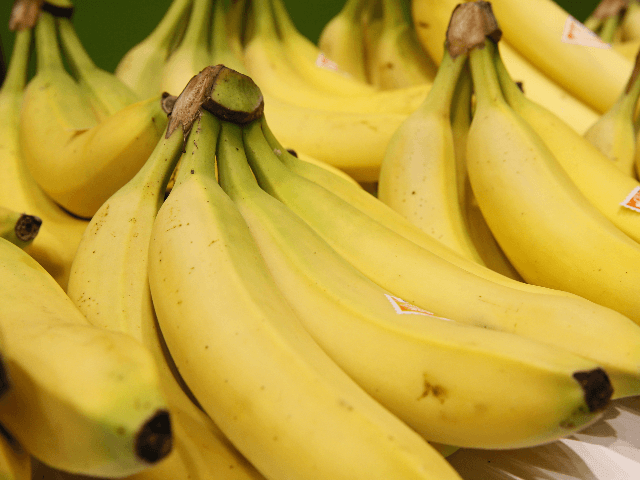Radio Rebelde, the website of a state-sponsored radio station in Cuba, published an article urging Cubans to eat banana and plantain peels and use them as painkillers and skin cleansers, astute online observers noted on Thursday.
The Cuban interest website Periódico Cubano picked up on this week’s lifestyle advice from the Communist Party noting the extreme food, medicine, and fuel shortages in the country currently, the result of over half a century of communist rule and the collapse of the regime’s oil-rich colony Venezuela.
Radio Rebelde did not go as far as to suggest using banana peels to power cars, but the list of uses it claimed the food waste product reliable for was nonetheless prodigious.
“Plantain or banana is one of the most consumed fruits in the world,” the article began. “What you might not know is that the peel is just as nutritious as the interior: it contains iron, potassium, and vitamins B, C, and K and, if that were not enough, also contains good amounts of manganese, fiber, antioxidants, and copper.”
Among the uses for banana peel the article recommends is to smear it on the face for clearer, healthier skin; to use in healing mosquito bites; to wipe across the forehead as a painkiller; to whiten teeth by brushing them with peel; and to “improve humor.”
“Banana peel contains a good amount of tryptophan. This amino acid helps promote the production of serotonin, known as the ‘happiness hormone,'” Radio Rebelde claimed. “It regulates mood and if one has low levels of it, this translates into a bad mood, depression, and irritability.”
“With two banana peels a day for three consecutive days, you will raise serotonin levels up the 16 percent,” Cuban state media alleged.
The article appears to be an attempt to help Cubans find alternatives to basic food and medicine goods that have now all but disappeared from the island. Cuba’s communist economy is, by its nature, parasitic, and collapsed after the Soviet Union fell, recovering only when late dictator Hugo Chávez attached the might of Venezuela, then the wealthiest nation in Latin America, to Havana’s repressive regime. Two decades later, socialism has turned Venezuela into an economic disaster even more acute than Cuba, leaving the island with no way of generating funds while maintaining the lavish lifestyles of the Castro family and their hangers-on.
As, in all communist states, the wealthy never make any sacrifices to their lifestyle for the greater good, the economic crisis trickled down immediately to the people.
The food shortages are, by now, old news. In late 2018, Cubans began experiencing shortages in bread, eggs, chicken, and other basic food goods. “President” Miguel Díaz-Canel, the second-in-command to dictator Raúl Castro, blamed “the Trump administration” and the decades-old unenforced embargo on trade with America for the shortages while acknowledging that Cuban wheat production had collapsed. Cuban officials blamed a lack of replacement parts for the nation’s most vital flour mills for those shortages, then blaming capitalist countries for not selling the parts to them. Cuban dissident groups documented long food lines as early in the decade as 2016, however, challenging the idea that the election of President Trump caused the government to create food shortages.
By May of this year, the government began rationing food, following a speech in April in which Castro warned the country to prepare for the “worst case” economy.
Cubans turned the Soviet-style ration lines into an online selfie “challenge.”
Regime officials attempted to mitigate public discontent by claiming on state television that the people enjoyed having their food rationed. Cuban Interior Commerce Minister Betsy Díaz Velázquez said on television in May that the rations were necessary because some individuals were “hoarding” food, and that “there are a variety of different opinions, most consider these [rations] good and even insist on us continuing to ration products.”
The Cuban regime has since begun rationing soap and household detergents and has almost completely run out of basic medicines, mirroring the humanitarian disaster in Venezuela. According to a report in the Diario de Cuba newspaper this week, the most commonly missing medications from pharmacies include those for chronic diseases – such as asthma and heart conditions – as every patient who needs them needs them for life.
Cuba has begun arresting individuals who have communicable diseases like dengue to prevent their spread.
The most recent good to face significant shortages in Cuba is gasoline. Cubans have been forced to wait on hours-long lines in their dilapidated old cars for gasoline rations throughout the summer, the situation worsening following sanctions imposed on the Venezuelan oil industry in September for subsidizing human rights abuses against the Venezuelan people. Reports suggested this week, following Russian Prime Minister Dmitry Medvedev’s visit to Havana, that the Cuban regime is seeking Russian help to escort Venezuelan oil into the island illegally.
Medvedev said publicly Russia was committed to helping Cuba develop its energy resources in the long-term, but said nothing about helping oil reach Cuba today.

COMMENTS
Please let us know if you're having issues with commenting.